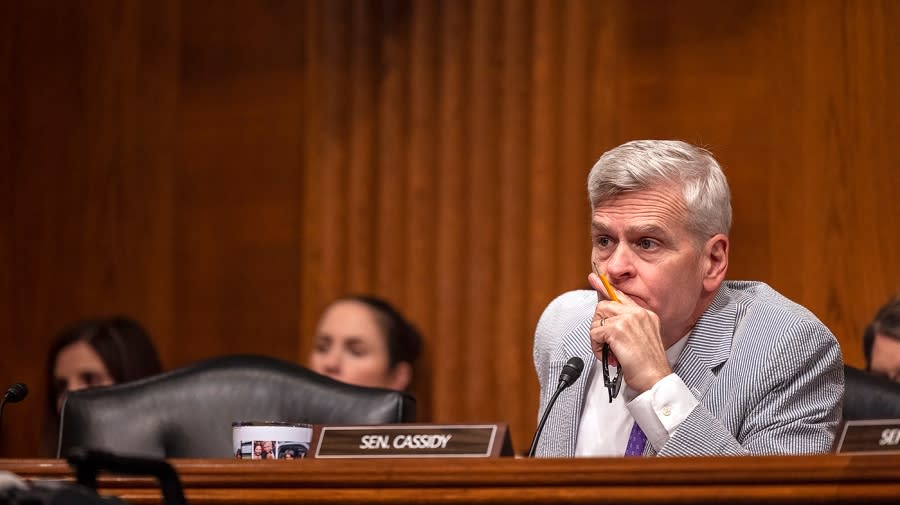Republicans play offense on student loans ahead of SCOTUS decision
- Oops!Something went wrong.Please try again later.
Republicans are taking advantage of a perceived opening on student loans, proposing legislation to tackle the issue in both the House and Senate this week ahead of the Supreme Court’s upcoming decision on the legality of President Biden’s relief plan.
Experts are skeptical the conservative-majority justices will uphold Biden’s forgiveness proposal, but his administration has been mum on alternative plans.
“I think it’s definitely important because if Biden’s plan falls down, he hasn’t proposed any solutions that actually address the problem, the underlying cause of why students are being forced to take out so much money just to attend higher education,” a GOP Senate aide told The Hill.
While Democrats have stayed quiet, likely to avoid weakening Biden’s case in front of the Supreme Court, Republicans have been on the move.
More education coverage from The Hill
College Board says it won’t alter AP courses to comply with Florida’s laws
‘Maus’ author Art Spiegelman: Book bans show ‘yearning’ for authoritarianism
On Wednesday, GOP senators proposed five bills, packaged as the “Lowering Education Costs and Debt Act,” which aim to tackle how colleges give students information before they attend and would enact changes to federal student loan options.
Two of the five bills focus on the data a student is given before attending school, such as creating a uniform template for financial aid offer letters so applicants can better compare their options, and requiring updates to the college reporting system that informs students of success rates in school programs.
The other three bills would tackle problems with the federal student loan system, such as simplifying repayment options, setting requirements for students to be informed on how long a loan would take to pay back and what their monthly payments would be, and reforming loans for graduate students.
“Our federal higher education financing system contributes more to the problem than the solution. Colleges and universities using the availability of federal loans to increase their tuitions have left too many students drowning in debt without a path for success,” Sen. Bill Cassidy (R-La.) said.

Sen. Bill Cassidy (R-La.) listens during a hearing concerning the state of mental health in youth with the Senate Health, Education, Labor, and Pensions Committee at the Capitol on Thursday, June 8, 2023.
“Unlike President Biden’s student loan schemes, this plan addresses the root causes of the student debt crisis. It puts downward pressure on tuition and empowers students to make the educational decisions that put them on track to academically and financially succeed,” Cassidy added.
Two of the bills were previously introduced and obtained bipartisan support. The Republican aide said the rest have “nothing partisan about it. It’s just good, real solutions trying to address some issues that Americans are having to deal with,” but not everyone agrees.
“None of this addresses the root problem,” the Student Debt Collective said in response to the legislation. “We don’t have an ‘information’ crisis. We have a student debt crisis. These bills will guarantee the crisis only gets worse for future generations. This is doubling down on debt-for-education.”
While the Senate is narrowly controlled by Democrats, some members of the majority have been willing to play ball with Republicans on student loans. Democratic Sens. Joe Manchin (W.Va.) and Jon Tester (Mont.), along with Independent Sen. Kyrsten Sinema (Ariz.), recently voted with their GOP colleagues against Biden’s student debt relief plan.
Sign up for the latest from The Hill here
In the Republican-controlled House, the majority introduced the Federal Assistance to Initiate Repayment (FAIR) Act on Thursday. Under that bill, borrowers who already paid off the original principal and interest amount on their student loans would receive debt relief. Borrowers who have defaulted can also get the mark off their credit report by enrolling in an affordable program and making their monthly payments.
Other measures in the act include halting Biden’s new income-driven repayment program, simplifying the federal student loan repayment options and requiring the Department of Education to take certain steps to support student loan servicers as repayments turn back on with the termination of the pandemic-related pause at the end of the summer.
“The nearly $300 billion dollar Income-Driven Repayment (IDR) plan results in just two in 10 undergraduate students fully repaying their loans,” House Education and the Workforce Committee Chairwoman Virginia Foxx (R-N.C.) said. “The FAIR Act would offer an alternative to Biden’s IDR plan, providing borrowers with a predictable and affordable IDR plan, while also protecting taxpayers and bringing clarity to borrowers and servicers as the return to repayment process begins.”

House Education and Workforce Committee Chairwoman Virginia Foxx (R-N.C.) speaks during a press event to highlight the introduction of the “Parents Bill of Rights” on Wednesday, March 1, 2023.
With the Supreme Court set to release its decision on Biden’s student loan forgiveness in the next two weeks, Republicans now have the ability to run on their platforms as an alternative to Biden’s plan, which was expected to cost around $400 million.
“Voters are anxious about the economy and their own personal pocketbooks, and there is little appetite for a massive tax increase or further government spending to pay for this student loan boondoggle,” said Robert Blizzard, a veteran Republican strategist.
Democrats have not been as clear on their next steps, but Biden has already received plenty of backlash for the bipartisan debt ceiling agreement that puts an end to the student loan pause at the end of the summer.
While advocates were hoping they could get the president to extend the student loan pause again, especially if the Supreme Court ruled against debt relief, payments will now officially resume in October, and interest will begin accruing again in September.
Rep. Pramila Jayapal (D-Wash.) and Sen. Bernie Sanders (I-Vt.) announced Friday they were introducing the College for All Act, which aims to make tuition free for most families at four-year institutions and community college completely free, though the measure has little chance of making it through Congress.
“I am so proud to lead this legislation that would free millions of students from a lifetime of debt and transform our country’s higher education system by ensuring that everyone can afford to pursue a higher education degree,” Jayapal said.

Rep. Pramila Jayapal (D-Wash.) speaks during a House Progressive Caucus press conference on the threat of defaulting at the Capitol on Wednesday, May 24, 2023.
The Student Debt Collective and the NAACP are holding a Monday rally on Juneteenth as they push the Biden administration for a new plan to cancel student loans even if the Supreme Court rules against the current attempt.
Before Biden released his proposal, top-level Democrats such as Senate Majority Leader Chuck Schumer (N.Y.) were calling for $50,000 in student debt relief. On the campaign trail, Biden said he was only willing to go as high as $10,000.
For the latest news, weather, sports, and streaming video, head to The Hill.

